
We sat down for a long chat with Creative about its current and future products, and it proved to be a very insightful conversation about how things have developed and how the company is branching out into yet more new fields of sound technology.
Before we got down to product discussion, the question I had to ask on behalf of many people is why haven’t we seen a PCI-Express X-Fi card? Finally we have an answer, the excuse being a combination of the technical change to PCI-Express and Windows Vista.
Creative tells us that PCI-Express was designed with graphics in mind, not sound cards. Sound cards are fundamentally different in that they require many frequent small packets of data to be transferred, but PCI-Express is tailored towards the massive data bandwidth movement needed by a graphics card.
So, basically, the engineering conversion requires more work than most add-in boards. The X-Fi was in development for some time before it was released, and the engineers concentrated on the sound rather than the future upgradability.
Creative has also blamed Windows Vista, claiming developing drivers for it was like "trying to move sand". It said that Microsoft kept changing the driver specifications in the final two years running up to its release. This included constantly fiddling with the DRM and UAA compliance. Creative claims it had to constantly go back and spend time re-engineering its drivers, taking time away from Windows XP updates as well as new product development.
Creative is due to finally bring out a PCI-Express audio card, but it will be the Xtreme Audio X-Fi only, which is a host based non-hardware accelerated solution. This will be available from June, at around £49 to £59 in the UK. There is, however, currently no timescale for a hardware accelerated PCI-Express X-Fi solution from Creative.
With this revelation, we believe Creative is losing out to its competitors that are already in the process of moving to the PCI-Express x1 interface. These same competitors are including all sorts of advanced Dolby and DTS technologies, although Creative will still be the only one with hardware accelerated sound processing. Having said that, with four cores hitting mainstream this year it may be unnecessary and X-Fi could quickly be falling out of favour.
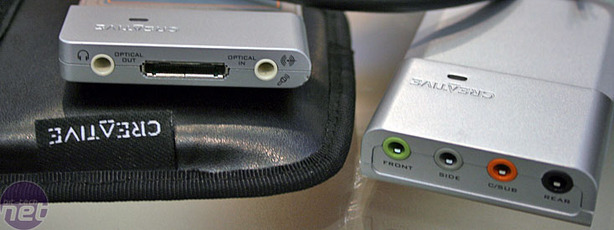
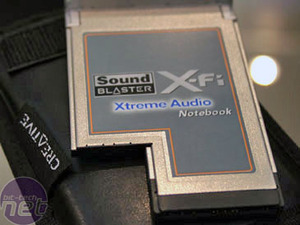
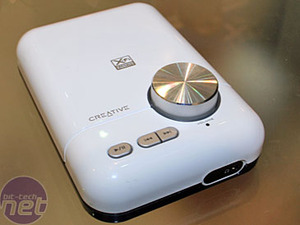 [/center]
[/center]
The subsequent DTS addition can be picked up by any compatible receiver unit which will decode it like any normal DTS stream; however, you can only have CMSS-3D and DTS:Interactive on together, not either/or.
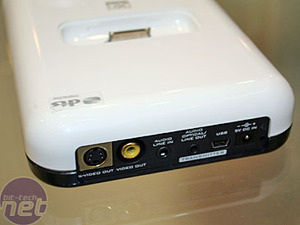
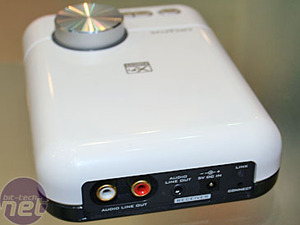 The X-Dock is the iPod docked version, whilst both also have dual purpose digital and analogue line in inputs to stream music from your PC/Hi-Fi/MP3 player.
The X-Dock is the iPod docked version, whilst both also have dual purpose digital and analogue line in inputs to stream music from your PC/Hi-Fi/MP3 player.
The connections are all gold plated and there are no drivers to install. Audio is streamed at 2.4GHz uncompressed to a distance of up to 30 meters. Although Creative didn’t expressly stipulate that you could change the frequency, we hope this is a feature.
Whilst the XMod and XDock come with one receiver unit, you can add more and link them to a single transmitter.
For gamers, Creative is also set to release a Fatal1ty gaming headset as soon as next month. They are reasonably light and comfortable with soft padded ear pieces and headband, although it’s only available in a supra-aural design. It also has a detachable, noise cancelling microphone so if you don’t need to use it, it doesn’t flap around at the side of your head.
UPDATE 26th March: After a quick word with Creative they've updated us on a few details: The X-Fi notebook will be 80 Euro's and the 7.1 adapter will be 35 Euros, obviously making this indefinitely cheaper in £.
The Xmod ships with one receiver but the Xdock requires one to be purchased separately. All will be black. You can't manually change the frequency but it will auto hop to find a free channel in case you've got an installed wireless network or any other electronic equipment on the 2.4GHz frequency range.
The PCI-Express Xtreme Audio card will be around the same price point of the current PCI model, undercutting the price of most, if not all PCI-Express x1 cards. We will have to wait until we receive one to tell you how it performs, however.
Before we got down to product discussion, the question I had to ask on behalf of many people is why haven’t we seen a PCI-Express X-Fi card? Finally we have an answer, the excuse being a combination of the technical change to PCI-Express and Windows Vista.
Creative tells us that PCI-Express was designed with graphics in mind, not sound cards. Sound cards are fundamentally different in that they require many frequent small packets of data to be transferred, but PCI-Express is tailored towards the massive data bandwidth movement needed by a graphics card.
So, basically, the engineering conversion requires more work than most add-in boards. The X-Fi was in development for some time before it was released, and the engineers concentrated on the sound rather than the future upgradability.
Creative has also blamed Windows Vista, claiming developing drivers for it was like "trying to move sand". It said that Microsoft kept changing the driver specifications in the final two years running up to its release. This included constantly fiddling with the DRM and UAA compliance. Creative claims it had to constantly go back and spend time re-engineering its drivers, taking time away from Windows XP updates as well as new product development.
Creative is due to finally bring out a PCI-Express audio card, but it will be the Xtreme Audio X-Fi only, which is a host based non-hardware accelerated solution. This will be available from June, at around £49 to £59 in the UK. There is, however, currently no timescale for a hardware accelerated PCI-Express X-Fi solution from Creative.
With this revelation, we believe Creative is losing out to its competitors that are already in the process of moving to the PCI-Express x1 interface. These same competitors are including all sorts of advanced Dolby and DTS technologies, although Creative will still be the only one with hardware accelerated sound processing. Having said that, with four cores hitting mainstream this year it may be unnecessary and X-Fi could quickly be falling out of favour.
Creative Sound Blaster Xtreme Audio Notebook
Creative showed off a new X-Fi Xpress card for laptops, providing 2.0 channel sound with integrated X-Fi 24bit crystalliser. The jacks are dual purpose for optical output as well as stereo analogue output. It’s faster and more integrated than a USB solution, but does require your laptop to have an Xpress slot. If you want to upgrade to 7.1 channel surround sound, there is an adapter cable that adds the extra four 3.5mm analogue ports. Both are arriving in June and will cost £80 and £35 respectively.

 [/center]
[/center]Creative XDock & XMod
The XDock and XMod Wireless are transmitters that can stream your audio around the house. Naturally they contain the X-Fi 24bit crystalliser to increase the fidelity of compressed music, and CMSS-3D and DTS:Interactive for converting stereo sound into a DTS surround sound experience when using stereo speakers or headphones.The subsequent DTS addition can be picked up by any compatible receiver unit which will decode it like any normal DTS stream; however, you can only have CMSS-3D and DTS:Interactive on together, not either/or.


The connections are all gold plated and there are no drivers to install. Audio is streamed at 2.4GHz uncompressed to a distance of up to 30 meters. Although Creative didn’t expressly stipulate that you could change the frequency, we hope this is a feature.
Whilst the XMod and XDock come with one receiver unit, you can add more and link them to a single transmitter.
Creative Headphones
Creative is also branching out into the high fidelity headphone market and are due to release noise cancelling X-Fi Headphones in Q3 this year at £199. After using a demonstration pair, the noise cancelling works really very well, and again the product contains an inbuilt X-Fi 24bit crystalliser. Why you’d spend £200 on a pair of headphones to play MP3’s through I'm not sure, but since you can turn the X-Fi 24bit Crystalliser off, I suppose it adds to the choice and variety of potential use.For gamers, Creative is also set to release a Fatal1ty gaming headset as soon as next month. They are reasonably light and comfortable with soft padded ear pieces and headband, although it’s only available in a supra-aural design. It also has a detachable, noise cancelling microphone so if you don’t need to use it, it doesn’t flap around at the side of your head.
UPDATE 26th March: After a quick word with Creative they've updated us on a few details: The X-Fi notebook will be 80 Euro's and the 7.1 adapter will be 35 Euros, obviously making this indefinitely cheaper in £.
The Xmod ships with one receiver but the Xdock requires one to be purchased separately. All will be black. You can't manually change the frequency but it will auto hop to find a free channel in case you've got an installed wireless network or any other electronic equipment on the 2.4GHz frequency range.
The PCI-Express Xtreme Audio card will be around the same price point of the current PCI model, undercutting the price of most, if not all PCI-Express x1 cards. We will have to wait until we receive one to tell you how it performs, however.

MSI MPG Velox 100R Chassis Review
October 14 2021 | 15:04








Want to comment? Please log in.